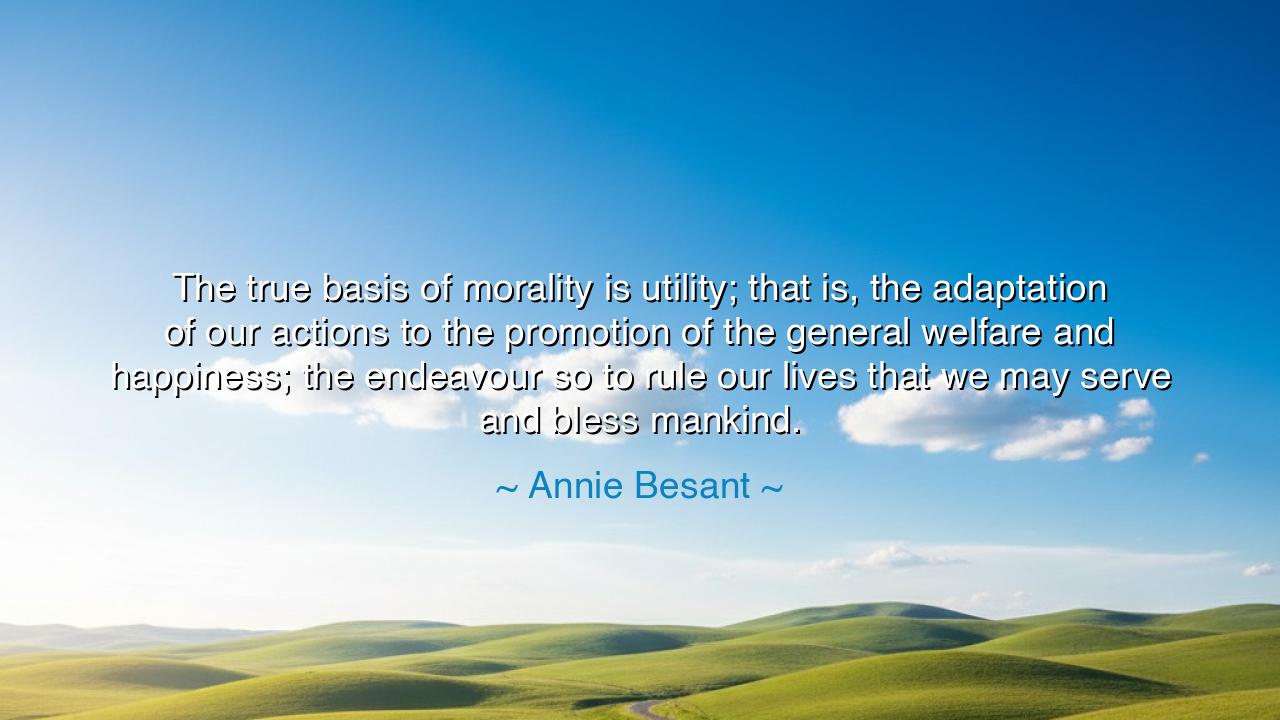
The true basis of morality is utility; that is, the adaptation of
The true basis of morality is utility; that is, the adaptation of our actions to the promotion of the general welfare and happiness; the endeavour so to rule our lives that we may serve and bless mankind.






“The true basis of morality is utility; that is, the adaptation of our actions to the promotion of the general welfare and happiness; the endeavour so to rule our lives that we may serve and bless mankind.” Thus spoke Annie Besant, the philosopher, reformer, and orator whose voice bridged the worlds of reason and spirit. In this radiant saying, she offers not a cold formula of ethics, but a living creed—a call to service, to compassion, and to the moral courage of those who live not for themselves but for all. Her words rise like a hymn to the dignity of purposeful living, reminding us that virtue is not found in belief alone, but in action directed toward the welfare of humanity.
The quote springs from the philosophical current known as utilitarianism, born in the 18th and 19th centuries from thinkers such as Jeremy Bentham and John Stuart Mill, who taught that the measure of good and evil lies in their consequences—specifically, in whether they increase or diminish the happiness of sentient beings. Yet Annie Besant, in her luminous spirit, took this doctrine beyond calculation. For her, utility was not mere arithmetic of pleasure, but a sacred harmony between moral intention and universal good. She saw morality not as a law imposed from without, but as a living principle within—a conscious choice to “serve and bless mankind.”
Besant herself embodied this truth. Born into Victorian England’s rigid moral order, she defied convention in pursuit of justice. Once a minister’s wife, she became a champion of freedom, an advocate for women’s rights, education, and labor reform. Later, in India, she fought for independence and spiritual renewal, becoming a guiding light to millions. Her life was the embodiment of her own teaching: to “rule our lives” not by fear, nor by selfish desire, but by a deliberate striving toward the good of all. In her heart, morality was not restraint—it was liberation, the joy of knowing one’s life contributes to the rising tide of human happiness.
The ancients, too, knew this truth though they clothed it in other words. Marcus Aurelius, the philosopher-emperor, wrote that the nature of man is to work for the common good, for what benefits the hive benefits the bee. And in the words of the Buddha, compassion was the purest virtue, the foundation of enlightenment. In every age and faith, the great teachers converge on Besant’s vision: that the highest moral calling is to live in harmony with others, seeking their well-being as one’s own. The utility of virtue, then, is not its outward reward, but its inward peace—the soul’s recognition that it stands not apart from life, but within it.
Consider the example of Florence Nightingale, who walked through the camps of the wounded during the Crimean War. She did not speak of theories or creeds; she acted. Her compassion healed bodies, but her courage awakened nations. In her, as in Besant’s vision, the promotion of general welfare became a sacred duty. Her morality was not carved in books but lived in service; her utility was not in profit but in mercy. And from her light, generations of healers and caregivers have drawn strength. She stands as proof that when one human being chooses to serve and bless mankind, the world itself is renewed.
The lesson, then, is this: morality must be lived, not preached. It is not the shadow of obedience, but the flame of love. Every choice, great or small, is an opportunity to align the self with the greater good—to bring comfort where there is pain, to bring hope where there is despair. Ask not, “What do I gain?” but “Whom do I serve?” For in serving others, we find the deepest form of joy—the joy of purpose fulfilled. Happiness, in its truest sense, is not the fleeting pleasure of possession, but the steady peace of participation in the universal good.
To live by Besant’s wisdom, one must adapt one’s actions daily toward kindness, justice, and truth. Let each deed, each word, each thought be weighed not by pride, but by its fruit—does it heal or harm? Does it uplift or oppress? The moral life is not perfection, but progress—the continual turning of the heart toward light. And when at last one’s days draw to their close, it will not be wealth or acclaim that endure, but the quiet legacy of having blessed others, of having made the world gentler, fairer, more whole.
Thus remember Annie Besant’s timeless truth: that morality is not the constraint of the soul but its expansion, not submission to law but cooperation with love. To live for oneself is to live in shadows; to live for all is to live in light. Therefore, rule your life with wisdom, strengthen it with friendship, and dedicate it to the service of humankind—for in blessing others, you will find your truest happiness, and in serving the world, you will fulfill the sacred purpose of your existence.






AAdministratorAdministrator
Welcome, honored guests. Please leave a comment, we will respond soon